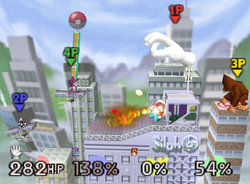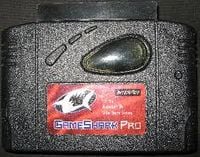GameShark

The GameShark is a cheating device designed for the Nintendo 64 console; it was not released for later Nintendo systems. GameShark is frequently used to hack Super Smash Bros, similar to how the Action Replay is used to hack into Super Smash Bros. Melee. Apart from simply cheating at the game, it is useful for accessing content that is not normally available. Common examples include fighting in stages (such as Final Destination, the "demo" stage, or even beta versions of Kirby's level) and playing as characters (Metal Mario, Master Hand, Giant DK, or a Fighting Polygon) that cannot be accessed normally.
It was orignally designed for the Playstation and the Sega Saturn, but has been created for many other consles.
Unfortunately, the use of Gameshark with Smash Bros. also triggers a glitch that forces the player to play as Mario in single-player mode, even after the Gameshark has been removed. The only known way to undo this is to erase the game data.
Abilities in Super Smash Bros.
By using a GameShark for Super Smash Bros., a player can do the following things:
Characters
Users are able to play as non-playable characters using this this device. It includes:
- Master Hand
- Metal Mario
- Fighting Polygon Team
- Users can play as the polygon versions of every character in the game.
- Giant Donkey Kong
Stages
Other Features
- Users have the ability to see the Congratulations screens of every character in the game.
- Users can adjust the damage percentage of every player.
- Users can go to any stage of 1P mode.
- Users are able to make CPUs walk, run, stop, or attack.
- There is also a "demo" option that makes the player literally do nothing. The animation won't play and the player can't attack or touch it.
System Debug
Uses in Project 64k and Mupen 64K
Gameshark is used often in emulators to unlock characters and stages instantly, as it is usually difficult to save with emulators in online play. To solve this, the "unlock all characters" and "Mushroom Kingdom" (to unlock item switch) cheats are switched back off and on at the beginning of the match. Failure to do this usually causes a desynch, as the first player is playing with a different set of codes than the second player and so on.


